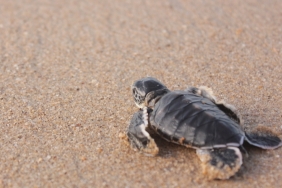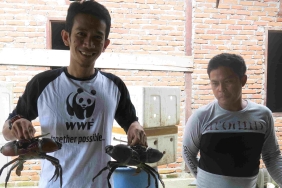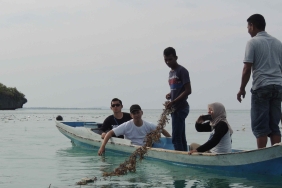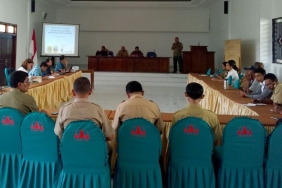INDONESIA-MALAYSIA "TURTLE HERO" SCOUT CAMP
As a form of implementation of the partnership built by the World Organization of the Scout Movement and WWF in reviving the "PANDA BADGE", the Sambas Regency Scout Movement held a Pandega Scout Camp "Turtle Hero-World Scout Environment Programme (WSEP)" on February 14-16, 2020 at the Belacan River Turtle Monitoring Post, Paloh. One of the objectives of this activity is to campaign for love of the environment. This activity was attended by 40 participants from Kwartir Cabang (Kwarcab) Sambas, 15 participants from Messenger of Peace (MoP) Kuching Serawak Malaysia, 50 local observers.
The Paloh Branch Quartet along with the Sambas Branch Council and Paloh Branch Council, with the guidance of the Sambas Scout Messenger of Peace (MoP)Local Coordinator, carried out the turtle hero activity as one of the Indonesian Scout's Purple Ventures and Rovers for the environment which aims to increase human awareness of the importance of protecting the environment in order to save turtles from the threat of plastic waste and human activities that damage marine and coastal ecosystems, which can lead turtles to the brink of extinction.
The event was officially opened by the Vice Regent of Sambas, Hj. Hairiah.SH.MH, and attended by the Chairman of Sambas DRPD, Representatives of Kwarnas and MoP Asia-Pacific, as well as various other stakeholders in Sambas Regency.
In her speech, Hairiyah mentioned that Paloh Sub-district is a nesting beach for 4 types of sea turtles, therefore it is the responsibility of all of us to make protection efforts. As is known, 3 types of sea turtles, namely the Green Turtle (Chelonia mydas), Hawksbill Turtle (Eretmochelys imbricata) and Olive Ridley Turtle (Lepidochelys olivacea) are found climbing the 63 km long shoreline to lay eggs, While Leatherback turtles (Dermochelys coriacea) have been found stranded dead, and have been caught accidentally by fishermen (bycatch) in Paloh waters.
The Paloh coast is also home to various key species that play an important role in the ecosystem such as the Proboscis Monkey (Nasalis larvatus), Muara Crocodile (Crocodylus porosus), Finless Porpoise (Neophocaena phocaenoides), Humpback Dolphin (Sousa chinensis), Horse Treaded Mussel (Tachypleus gigas), Hornbill, and so on.
"Many efforts have been made every year such as working with WWF, the Marine and Fisheries Service, and various organizations including the Scouts to organize the Paloh Coastal Festival activities. One of the goals is to campaign that we love the environment and want to save the turtle habitat so that it does not perish," he said.
Hariyah said that it is very important for us to be responsible for the survival of sea turtle habitats, one of which is by not eating sea turtle eggs and also spreading the spirit of saving sea turtles and their habitats. "And the spirit of the Scout participants in protecting the turtle habitat and pledging to be a hero in saving the environment, especially saving the turtle habitat," she concluded.
The activity themed "Save Sea Turtles from Threats and Extinction Starting from Me, You and All of Us" was filled with a series of activities such as cleaning the beach from waste, especially plastic, planting trees, releasing hatchlings, monitoring sea turtles and socializing about Messenger of Peace followed by Gathering Messenger of Peace and discussion activities about WSEP and scout.org.
WWF-Indonesia had the opportunity to present material on the role of youth in marine conservation and Paloh turtle conservation. In addition, the Paloh Turtle Monitoring Team, which is the Pontianak Coastal and Marine Resource Management Center (BPSPL) Turtle Enumerators from the Kambau Borneo Community Supervisory Group (Pokmaswas) and the Wahana Bahari Community Group, fully assisted during the implementation of the activity at the Paloh Belacan River Monitoring Post.
Monitoring Paloh River.





